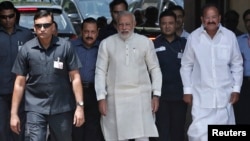Western governments are rushing to visit India's new Prime Minister Narendra Modi, drawn by the prospect of multi-billion-dollar deals as the government prepares to open the nascent defense industry to foreign investment.
Senior politicians from France, the United States and Britain arrive over the next few weeks as Modi prepares to accelerate the modernization of the country's mostly Soviet-era weaponry.
Modi intends to build up India's military capabilities and gradually turn the world's largest arms importer into a heavyweight manufacturer - a goal that has eluded every prime minister since independence in 1947.
On the table is a proposal circulated within the new government to raise caps on foreign investment - with one option to allow complete foreign ownership of some defense projects.
"All the countries are trying to make their case, especially as there is the sense that the Indian market will undergo a shift," said Harsh Pant, professor of international relations at King's College London.
"They get a sense from their dealings that something dramatic is going to happen and they want first-mover advantage," said Pant, who specializes in Indian defense.
First to arrive in New Delhi will be French Foreign Minister Laurent Fabius, whose top priority is to close a stalled deal to sell India 126 Rafale fighter jets, built by Dassault Aviation, for an estimated $15 billion.
Fabius, who arrives on Monday, will meet Modi as well as his most powerful minister, Arun Jaitley, who holds the twin portfolios of defense and finance - and can therefore decide both whether to sign the deal and when to release the money.
U.S. Senator John McCain is also due in India next week.
McCain, whose Arizona constituency includes weapons makers such as Boeing and Raytheon, told the Senate on Thursday that Washington should seek to bolster India's economic and military rise.
"This is an area where U.S. defense capabilities, technologies, and cooperation - especially between our defense industries - can benefit India enormously," McCain said of India's drive to modernize the armed forces.
UK still hopeful on fighter jet
In July, Britain is likely to send in Foreign Secretary William Hague and finance minister George Osborne, a British government source said on Friday.
Britain has drawn some cheer from the slow progress of the negotiations for the Rafale deal. The Eurofighter Typhoon was shortlisted along with the Dassault fighter before India announced the French jet was the winner.
Cost escalations and disagreements about building the Rafale in partnership with India's state-run Hindustan Aeronautics Limited have complicated talks with France, and London has never entirely given up hope that it will return to the race.
However, on Thursday, one source at the Indian Defense Ministry said the deal was likely to be finally closed during Fabius' visit and could be signed this year. A French Foreign Ministry source said talks were ongoing, but refused to provide more detail.
Russia, for years India's top weapons supplier, pipped all three countries to the post, sending Deputy Prime Minister Dmitry Rogozin to visit the new government in Delhi two weeks ago. Washington last year replaced Moscow as India's top defense supplier, according to IHS Jane's.
The Western nations will have noted that India's foreign minister expressed displeasure with Russia's recent offer to sell Mi-35 attack helicopters to India's arch-rival Pakistan.
"I don't think it's a competition," U.S. Assistant Secretary of State Nisha Biswal said after an early post-election visit to New Delhi.
"India will have strong and positive relationships with a variety of countries and that is to be encouraged," said Biswal. "We want to see India taking on a stronger and a leadership role in the region and around the world so we welcome that."
$6 billion spree
India spent some $6 billion last year on weapons imports. It makes few of its own weapons, beyond ballistic missiles and assembly lines for foreign jets.
On Thursday, the government signaled it was in the mood for liberalization by allowing manufacturers to build more defense components without licenses, making it easier for Indian firms to partner foreigners.
At present foreign companies can only invest 26 percent in Indian defense projects without committing to technology transfer, which has put off many investors.
Before the election, sources in Modi's Bharatiya Janata Party said there was a plan to increase the cap to 49 percent.
"For higher-tech intellectual property we would want to go over 50 percent to be in a position to share technology that we have significant investments in," said Phil Shaw, chief executive of Lockheed Martin India Pvt Ltd.
"An uplift from 26 to 49 percent maintains the status quo and may not be sufficient incentive to make an investment here."
Lockheed Martin already has a 26 percent investment in an Indian joint venture with Tata Advanced Systems that manufactures airframe components for the C-130J Super Hercules cargo lifter.
India's Department of Industrial Policy and Promotion has circulated a discussion document that proposes allowing up to 100 percent foreign direct investment, or FDI, in defense production, two government officials told Reuters.
The note suggested allowing 100 percent FDI in manufacturing of state-of-the art equipment, one of the officials said. It also recommends a cap of 49 percent for investments which do not involve transfer technology and a 74 percent ceiling in such cases where the foreign investor is ready to share technology know-how, the official added.
Last week, Commerce and Industry Minister Nirmala Sitharaman said foreign investment in the sector would help increase defense preparedness of the country and reduce import dependence, saving billions of dollars in foreign exchange.
However, she said the government was yet to take a final call on increasing the FDI ceiling and the decision would be taken by Jaitley and Modi. The proposals face pockets of resistance in Indian industry, Modi's party and the military establishment.
A.K. Antony, who was India's longest serving defense minister until his Congress party's election defeat in May, said this week that allowing higher foreign investment in defense would be "suicidal."





